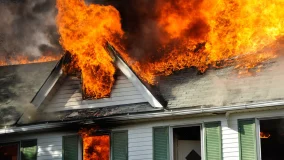7 Ways To Fireproof Your Apartment Or House
Fires in homes are devastating and dangerous. They cause damage, destroy property, and can even end with fatalities. It’s important to do everything you can to fireproof your apartment or house to avoid these disasters. Here are seven ways to do just that:
1. Clear Your Roof And Gutters Regularly
Leaves and sticks are perfect for kindling a flame, so you do not want them on your roof or in your gutter if a fire comes around. Clearing these areas often will help to prevent the embers from catching and igniting your roof. While up there, you should also inspect your external electrical wiring and have it replaced if it is old or frayed.
2. Keep Flammable Materials Like Paper And Magazines Away From Heat Sources
You might not think that something as harmless as a book or your mail can cause a fire, but if placed too close to a heat source, it could easily ignite. It’s best to keep all flammable materials at least three feet away from any heat source in your home, including candles, space heaters, and stoves. Additionally, you always want to make sure to put out or turn off heat sources when they can’t be closely monitored.
3. Don’t Overload Electrical Outlets And Extension Cords
If you overload electrical outlets or use extension cords not meant for frequent or heavy usage, it can cause an electrical fire. Be sure to follow the manufacturer’s instructions on the number of devices that can be plugged into an outlet, and don’t use any extension cords that are frayed or damaged. Surge protectors can help with this issue as well, but they still should not be overloaded.
4. Store Flammable Liquids Like Gasoline And Paint Thinner In Approved Containers Outside Of The Home
You should never store flammable liquids inside your home – if there is a fire, the vapors can easily ignite and cause an explosion. Be sure to keep these materials in approved, airtight containers outside of your home (preferably in a shed or garage). If you must bring them inside for short periods of time, use a metal container that will not conduct heat and place it on a non-flammable surface like concrete.
5. Don’t Run Electrical Cords Under Rugs Or Carpets
Many people do this to keep cords hidden and out of the way, but it’s a huge fire hazard. If the cord is damaged, it can easily start a fire that will quickly spread under the rug or carpet. Instead, use cord covers or keep cords elevated off the ground to prevent a fire from starting.
6. Create A Fireproof Barrier To Your Home
For fires caused by external sources, such as a forest fire or an inflamed neighbor’s home, you can make a border around your own home that will act as a break line to any approaching flames. Materials like gravel or concrete stop fires by cutting off their fuel source (dead grass, leaves, branches), giving them time to die out before spreading further. There are also some fire-resistant plants that you can add around your home as well, like buckwheat and oak trees, which will assist in protecting your home.
7. Always Have Protection
In the end, if precautions fail, you always want to know when a fire has started and have a way to put it out—or to get out! Make sure you have multiple smoke alarms in all rooms and stories of your home and test them regularly to ensure they are working. It’s vital to have at least one fire extinguisher in your home, so that you’re able to either douse a flame before it gets too big or make an escape from a larger fire.
By following these simple steps, you can help to fireproof your home and keep your family safe.
How Acceptance Can Help
At Acceptance, your family and their safety are important to us. We want to help you protect your home and belongings from fire damage. That’s why we offer great rates on renters insurance and home insurance that can protect you in an emergency. Learn more about our renters insurance coverage and by just entering your zip code.
Frequently Asked Questions About Fires And Home Safety:
What Are Some Common Causes Of Home Fires?
The most common causes of house fires are cooking accidents, improperly used or malfunctioning heating equipment, electrical problems, and smoking.
What Should I Do If There Is A Fire In My Home?
If there is a fire in your home, you should try to extinguish it if it is safe to do so. If the fire is too big or if you are unable to safely put it out, you should evacuate the premises and call 911. It’s a good idea to set up a plan with your family or roommates before the event of a fire so everyone knows what to do.
What Kind Of Insurance Do I Need To Protect My Home From Fire Damage?
Homeowners insurance typically covers the structure of your home and your personal belongings, while renters insurance covers your personal belongings.
DISCLAIMER: Material in these articles is for general information or entertainment purposes only. Acceptance Insurance does not endorse and is not affiliated with any of the companies or apps listed in this article. Acceptance Insurance is not responsible or liable for the availability of links to websites or resources, or for any content, advertising, products, services or other materials on or available through these websites or resources. Any references to third party rates or products are subject to change without notice. Trademarks are property of their respective owners. Information and coverage descriptions are general in nature. Actual coverage depends on the policy. Nothing in this article alters the terms or conditions of any of our renters policies. Homeowners policies are underwritten by third-party insurers that are not affiliated with Acceptance and are solely responsible for claims. Supplementary coverage options may be added to an insurance policy for an additional cost where applicable. See your agent for more information. Product and features are subject to underwriting criteria. Not all products, discounts, or payment plans are available in all states or distribution channels. All products described herein are subject to terms and conditions.



